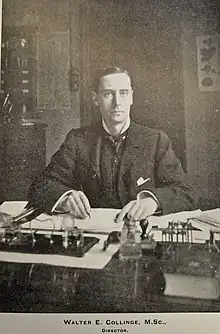Dr. Walter Edward Collinge | |
|---|---|
 Collinge at the Cooper Research Laboratory in 1909 | |
| Born | 19 April 1867 Huddersfield, England |
| Died | 24 November 1947 (aged 80) York, England |
| Occupation(s) | Zoologist Museum curator |
| Academic background | |
| Alma mater | University of St Andrews |
| Academic work | |
| Discipline | Zoology |
| Sub-discipline | Isopoda Ornithology |
| Institutions |
|
Walter Edward Collinge FSA FES FLS (19 April 1867–24 November 1947)[1] was a British zoologist and museum curator.[2] He is notable for his academic work on terrestrial slugs and Isopoda and on economic biology.[3][4]
Early life and education
Collinge was born in Huddersfield. He undertook his first degree at Leeds University before becoming a demonstrator in zoology at the University of St Andrews in 1891.[4]
Career
Collinge was a lecturer in zoology and comparative anatomy at Birmingham University when it was founded in 1900.[4] He was director of the Cooper Research Laboratory and edited the first volume of its journal in 1909.[5] From 1915–1919 he returned to St. Andrew's as the Carnegie Research Fellow at the Gatty Marine Laboratory.[4] He became Keeper of the Yorkshire Museum in March 1921 and stayed in this post until his retirement in March 1941.[2][4][6] During his tenure at the Yorkshire Museum, Collinge devoted much of his academic attention to the economic aspects of ornithology.[3]
Collinge was a member of many learned societies. He was a member of the British Numismatic Society,[7] a 'foreign member' of the American Association of Economic Entomologists, Honorary Fellow of the Royal Horticultural Society, joint secretary of the Association of Economic Biologists,[8] and a member of the British Ornithologists' Union.[3] He was a fellow of the Royal Entomological Society, the Linnean Society and the Society of Antiquaries of London, and had served as president of the Conchological Society of Great Britain and Ireland.[4]
Binominal authority
Collinge identified several species as new to science,Note 1 including Arion flagellus,[9] Cryptosemelus gracilis,[10] and Microparmarion pollonerai.[11]
Two species are named in honour of Collinge, Clanculus collingei and Streptaxis collingei.[12]
Publications
- Collinge, W. E. 1893. "Description of the anatomy &c. of a new species and variety of Arion", Annals and Magazine of Natural History (6) 12 (70). 252-254.
- Collinge, W. E. 1896 The Skull of the Dog: A Manual for Students with a Glossary of Osteological Terms. London.
- Collinge, W. E. 1902. "On the non-operculate land and fresh-water molluscs collected by the members of the "Skeat expedition" in the Malay Peninsula, 1899-1900", Journal of Malacology 9(3).
- Collinge, W. E. 1908. Report on the injurious insects and other animals observed in the Midland counties during 1904-07. Birmingham, Cornish bros.
- Collinge, W. E. 1912. Second report on economic biology. Birmingham, The Midland Educational.
- Collinge, W. E. 1913. The Food of some British Wild Birds: A Study in Economic Ornithology. London.
- Collinge, W. E. 1915. "Description of a new Genus and Species of Terrestrial Isopoda from British Guiana", Zoological Journal of the Linnean Society 32 (220), 509–511 doi:10.1111/j.1096-3642.1915.tb01872.x
- Collinge, W. E. 1917. "On the oral appendages of certain species of marine Isopoda". Zoological Journal of the Linnean Society, Zoology, 34. 65–92.
- Collinge, W. E. 1934. "On a Roman Phalera Found near Malton". Proceedings of the Yorkshire Philosophical Society (1934). 3–4.
- Collinge, W. E. 1935. "On Some Spoon-shaped Fibulae in the Yorkshire Museum and Elsewhere". Proceedings of the Yorkshire Philosophical Society (1935). 1–4.
- Collinge, W. E. 1935. "On a Roman memorial stone in the Yorkshire Museum. Proceedings of the Yorkshire Philosophical Society (1935). 5-6.
- Collinge, W. E. 1935. "Woodlice, their Folk-Lore and Local Names", The North-Western Naturalist 10. 19–21.
Note
References
- ↑ From paper archive in the Yorkshire Museum
- 1 2 Pyrah, B. (1988). The History of the Yorkshire Museum and its Geological Collections. North Yorkshire County Council. pp. 116–117.
- 1 2 3 "Obituaries: Walter Edward Collinge, 1867–1947". International Journal of Avian Science. 90 (3): 476. 2008. doi:10.1111/j.1474-919X.1948.tb01708.x.
- 1 2 3 4 5 6 "Obituary- Walter Edward Collinge, 1867–1947". Journal of Molluscan Studies. 28 (1): 3. 1949.
- ↑ "Introduction". Journal of the Cooper Research Laboratory. 1: 1909.
- ↑ "Obituary: Dr. Walter E Collinge, 1867–1947". Annual Report and Transactions of the Yorkshire Philosophical Society. Vol. 1947–1948. 12 April 1948. p. 7.
- ↑ "List of Members" (PDF). British Numismatic Journal. 19: 309–323. 1927–1928.
- ↑ Collinge, W. E. (1913). The Food of Some British Wild Birds: A Study in Economic Ornithology. Dulau & Co.
- ↑ "Arion flagellus". Global Biodiversity Information Facility. Retrieved 22 June 2023.
- ↑ "Cryptosemelus gracilis". Global Biodiversity Information Facility. Retrieved 22 June 2023.
- ↑ "Microparmarion pollonerai". Global Biodiversity Information Facility. Retrieved 22 June 2023.
- ↑ "Shellers from the Past: Collinge, Walter Edward (Phd)". www.conchology.be. Retrieved 22 June 2023.